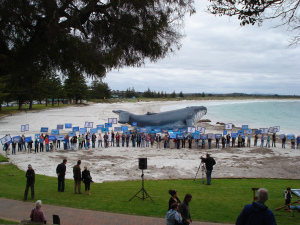Chris Pash's Blog, page 15
March 11, 2010
Whaling Foes Unite
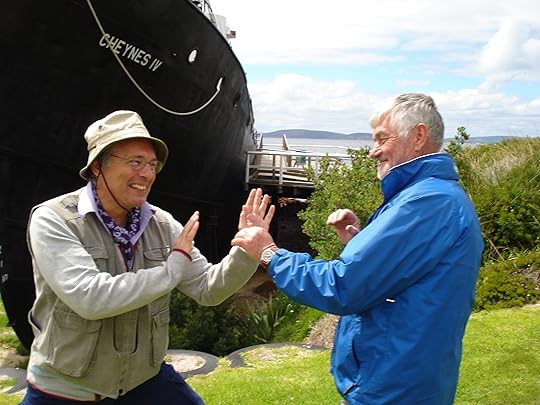
Activist Jonny lewis and whaler Kase Van Der Gaag meet for the first time in 2007
2007 protest at Albany, Western Australia, against Japan's plans to harpoon humpback whales
See the original post Sunday, November 4, 2007
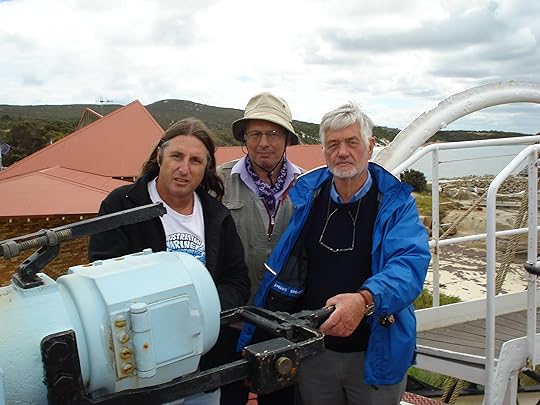
Writer Tim Winton, 1977 anti-whaling activist Jonny Lewis and former whaling ship Captain Kase Van der Gaag at the site of Australia's last whaling station (closed in 1978). They joined forces to speak out against the Japanese plans to harpoon 50 humpback whales in...
March 3, 2010
Photos – Australia's Last Whalers
November 21, 2008 – the 30th Anniversary of the closure of Australia's last whaling station at Albany Western Australia
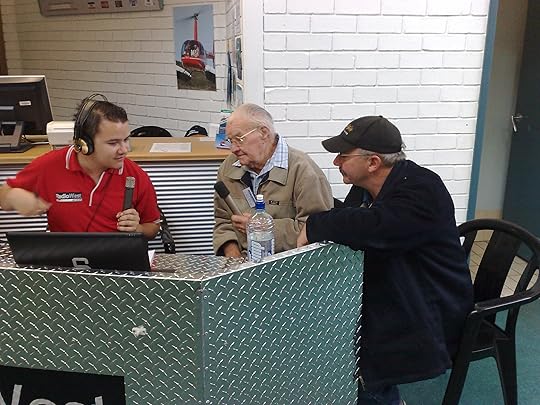
Father and Son: former whaling station workers Andy and Ray Woonings being interviewed by Radio West At WhaleWorld.
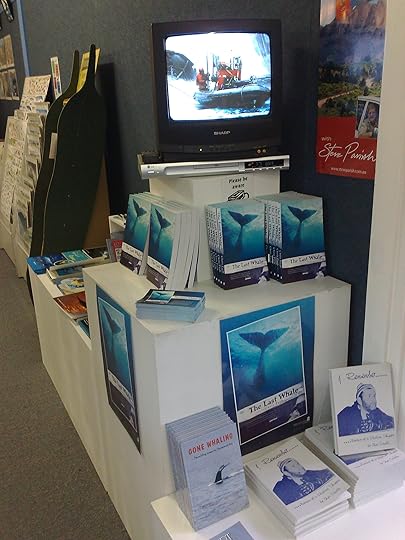
The Last Whale at the whaling station
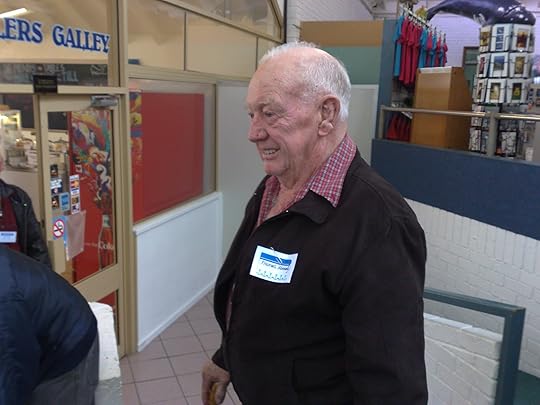
Tom Kennedy, former sonar operator Cheynes III
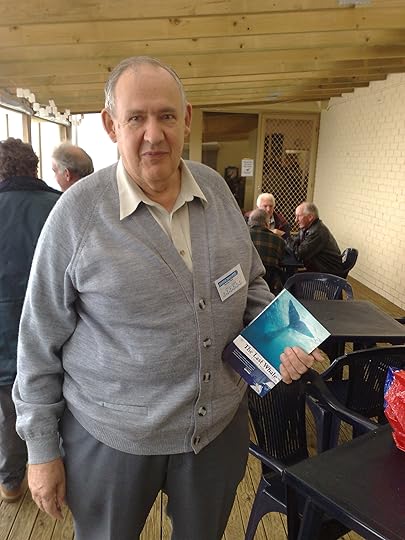
Derek 'Biggles' Padgett, former spotter pilot for the Cheynes Beach Whaling Company.
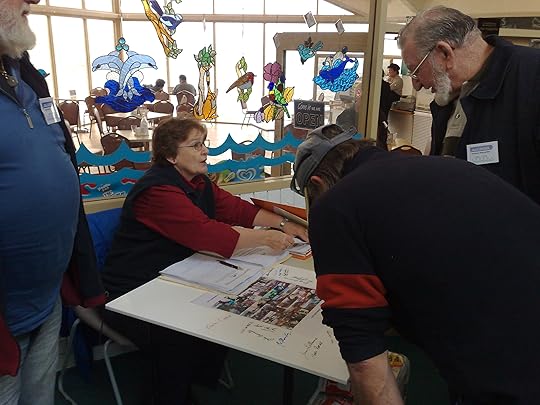
Yvonne Wallace, Curator at Whaleworld, Australia's last whaling station.






February 25, 2010
What year did whaling end in Australia?
The ABC TV program Can we Help? ran a segment (Friday, April 24, 2009), Moment in Time, about the end of whaling in Australia.
On the program Chris Pash, the author of The Last Whale, says: 'Every boy at school wanted to be a whaler because they were big tough guys and they earned big money and it was a wonderful adventure. In town, they were regarded very well, they were paid well and contributed to the economy.'
The program runs some very good archival footage of protests in 1977 against the ...
February 24, 2010
Whale Hunter Turned Protector
FIRST POSTED Sunday, December 14, 2008
Paddy Hart, the master and harpoon gunner of the Cheynes II whale chaser ship when Australia's last whaling station closed thirty years ago, was in Tokyo last week (December 2008) to protest whaling by Japan.
During the lead up to the closure, Paddy was a whale chaser skipper out of Albany, Western Australia, during Greenpeace's first direct action in Australia. Activisits took to Zodiac inflatable boats to place themselves between harpoons and whales.
As r...
February 23, 2010
Maritime History Book Prize
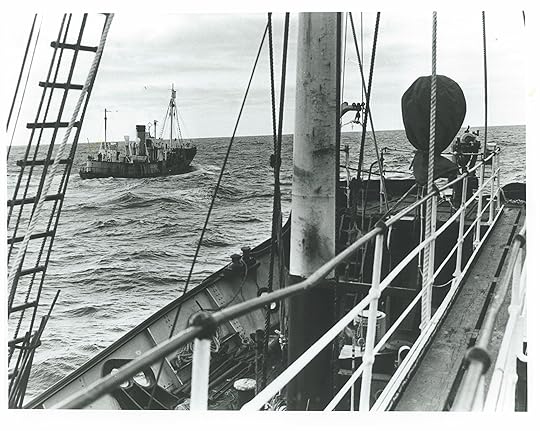
Australia's last whaling ships. Photo Copyright Ed Smidt. All Rights Reserved
The Last Whale by Chris Pash was shortlisted for the 2009 Frank Broeze Memorial Maritime History Book Prize.
Pash said: "I am happy for the recognition it gives to the last whalers of Albany, Western Australia, and happy also that the work of the anti-whaling activists is not forgotten.
"I don't see myself as a maritime historian – my job was to re-create the sea battle between the last whalers and the group of...
February 22, 2010
Review – Sydney Morning Herald (March 2008)
The Sydney Morning Herald 21 March 2008
Reviewer Bruce Elder said: "Given that whaling seems to be an eternally controversial issue it is a huge compliment to ex-journalist Chris Pash that he has managed to find an objective middle path in this engrossing story of the first Greenpeace campaign in Australia, which resulted in the closing of the country's last whaling station in Albany, Western Australia."
The Last Whale is published by Fremantle Press.
Elder said: "This is an important story but ...
The Last Whale Harpooned by Australians
(First POSTED Tuesday, September 4, 2007)
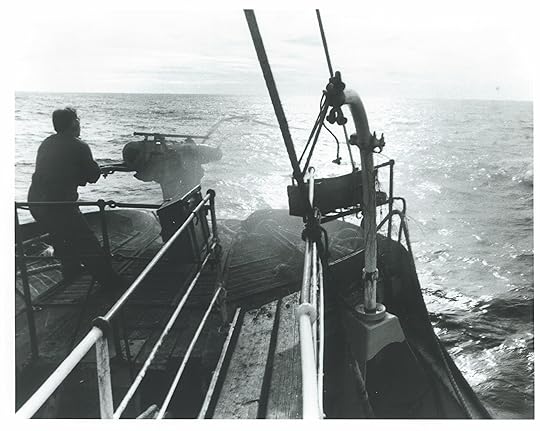
Gordon Cruickshank on the Cheynes III in 1977. Photo Copyright Ed Smidt. All Rights Reserved.
Over the 26 years that the Cheynes Beach Whaling Company operated, about 16,100 whales were harpooned: 14,600 sperms whales; 1,500 humpback whales (according to Whale World).
The last whale was caught on November 20, 1978. That day nine whales were harpooned.
To fill the annual quota of 713 whales, the three whales chaser ships had to take six female sperm...
The Last Whale Documentary

Filming at Australia's last whaling station
A documentary based on the book, The Last Whale, has started with filming in Albany, Western Australia, the site of Australia's last whaling station. The Director is Mick McIntyre.
"This documentary will get inside the heads of the whalers as they hunt sperm whales in Western Australia in the 1970s," said McIntyre.
McIntyre is close to finishing a six to seven minute trailer, which will used to seek funding for a full length documentary.
The...
February 18, 2010
No Humane Way to Kill a Whale: Tim Winton
(FIRST POSTED Monday, November 5, 2007)
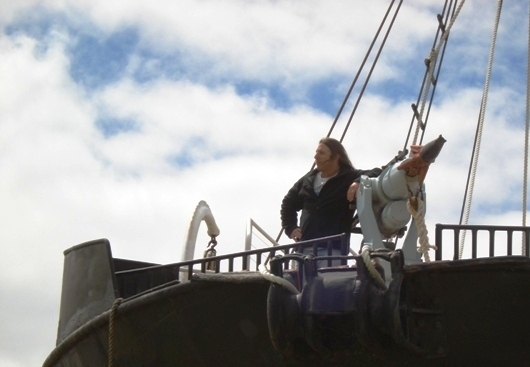
Photo by Chris Pash
Novelist and ocean activist Tim Winton credits his school days in Albany during the last days of whaling as deeply influential to both his work as a writer and environmentalist. His second novel, Shallows (1984) winner of the Miles Franklin Award, deals with the confrontation between whalers and conservationists on the high seas.
Tim Winton penned the following when he heard of an historic meeting between two of the main protagonists...
Two Harpoon Tom
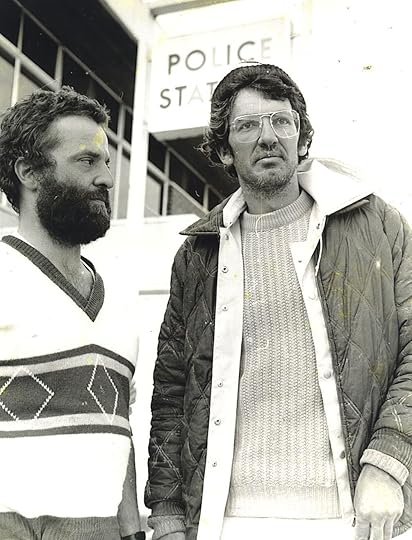
Jean-Paul Fortom-Gouin and Tom Barber 1977. Photo Copyright Jonny lewis
(First Posted Wednesday, September 12, 2007)
Tom Barber had close calls with explosive head harpoons twice during the campaign against the Cheynes Beach Whaling Company at Albany, Western Australia, August/September 1977.
Tom, fellow Australians Jonny Lewis and Allan Simmons, Frenchman Jean-Paul Fortom-Gouin and Bob Hunter, a Canadian and co-founder of Greenpeace, went up to 30 nautical miles into the Southern Ocean to run i...

